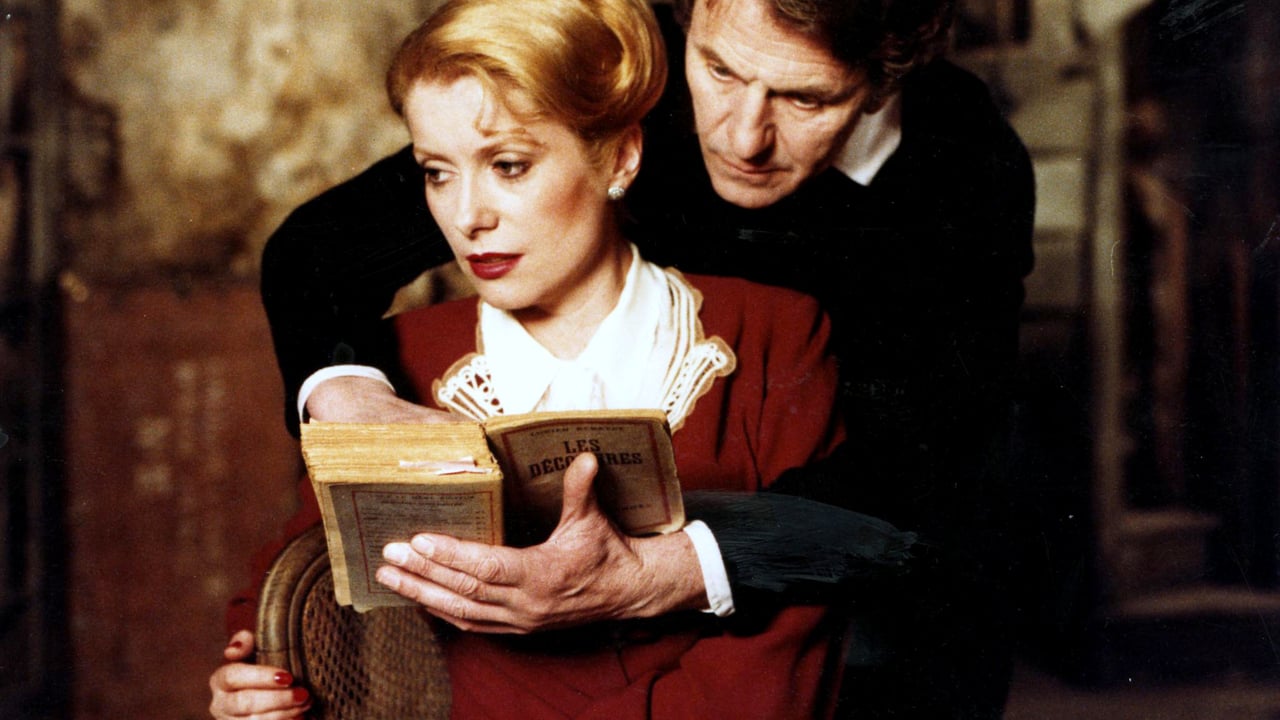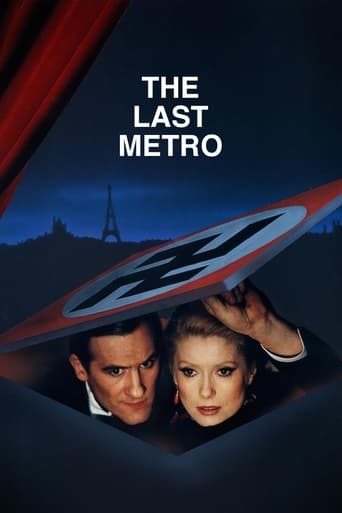

Truffaut's The Last Metro may seem like nothing too stylish, and perhaps compared to his early work it isn't. He takes his time telling this story and building up the characters and how they're all in this situation together circa WW2 in France (perhaps his version of To Be or Not To Be, with less jokes). In general, this film's greatness comes from simply containing wonderful, moving performances. Though I didn't know his work super extensively before this (outside of The Serpent's Egg), Heinz Bennet is the revelation here, to quote the film's own a-hole Nazi critic. But this is not to say that Deneuve isn't also exceptional, mostly in a performance that requires some understatement and listening, which is key for an actor. Especially when her character has to hide something in a conversation. And it all has a fine sense of the period and what 'theater' means.The Last Metro is an example of one of a few films that can be both really hopeful and really dark. And it has one of the most charmingly subversive endings in modern cinema.
... View MoreAs a sketch of an era, this affectionate story of the plain and symbolic parable of the stage is a tenderly staged and skillfully shot bit, and it substantiates Truffaut's passion for art and its power to endure even throughout the most turbulent of times. The story is set in 1942 and orbits mainly around the people working within the Théâtre Montmatre, a renowned Parisian theater that, like all theaters during the Occupation, is in perpetual peril of being shut down by the collaborationist Vichy government. The theater is run by its star Catherine Deneuve, the wife of the theater's Jewish director, Heinz Bennent, who has fled the country, or so he's thought to have. The theater has recently gotten an shot of fresh life in the form of Gérard Depardieu, a committed rising actor who made his bones at the Grand Guignol and has been hired to play the lead role in a Scandinavian play called Disappearance that Bennent chose right before his own vanishing act. Unbeknownst to the rest of the ensemble, Depardieu plots numerous feats of sabotage when he's not in rehearsal.The screenplay by Truffaut and Suzanne Schiffman builds drama along various interconnected threads. First is the future of the theater. Its unceasing threat owes to pervasive censorship, which is personified by the utterly vile, anti-Semitic theater critic Jean-Louis Richard, whose harsh reviews bear much more than just critical import. For Truffaut, who began as a film critic with a repute for being hardnosed and sometimes brutal, Richard's is a genuinely dismal individual as he has warped the critic's duty of promoting art into a poisonous mishmash of biased persecution and explicit prejudice. This links to a succeeding strand of conflict in the film, which is the problem of whether Bennent will be exposed. Deneuve is the only person who's aware of his location, and when she visits him it is both an effort to maintain their marriage and an occasion for him to give her notes on the direction of the play. Consequently, the director prolongs his creative undertakings clandestinely, using his wife as his puppet.There is also romantic friction in the film, as Deneuve and Depardieu cultivate an implicit attraction that, rather than drawing them together, deters them like divergent ends of a magnet. Both actors were foremost stars of the French cinema, and Truffaut uses their luminous screen presence to distinguished effect, protracting their attraction to one another like a piano wire that ultimately breaks when Depardieu goes off on Richard's behavior toward Deneuve in one of his reviews and thus puts the whole theater in jeopardy. Deneuve and Depardieu make an absorbing screen pair merely since they're so completely disparate, she being the elegant French beauty, composed and sophisticated, while he is an uncharacteristic French leading man, with his hulky body, odd looks, and coarse disposition. Early in the film Deneuve likens his character to Jean Gabin in La Bête Humaine, which lets Truffaut self-consciously associate his leading man to one of the French cinema's screen idols and also to allude to Renoir, one of his favorite directors.While there are countless characters in the film whose intermingling story lines compel its energy, the real hero is the Théâtre Montmartre itself, which becomes a badge of the strength of art and the spirit of resistance, both of which Truffaut idealizes almost to a blemish. We can see this in celebrated cinematographer Nestor Almendros's use of color, which is largely hues of amber and brown that are counterbalanced by the arresting use of red within the theater, portentous of the fervor of artistic triumph just within its otherwise measly frontage. It's for sure that this most clever of love stories is a crowd-pleasing movie that commemorates its characters' determination during a bleak time that many viewers at the time could still readily recall. And, while it is not one of Truffaut's most brilliant works, it is all the same a remarkable and appealing film, one that echoes the great filmmaker's affection fir inventive concept and its part in sustaining civilization.
... View MoreI kind of expected a "Paris under occupation" drama, but this wasn't it, it's more a mixed bag of goods. There isn't a lot of drama, actually, which makes this movie somewhat slow and tedious to watch.The plot: a celebrated Jewish-German theatre director (Heinz Bennent) fails to escape from occupied France, and has to hide in the cellar of his theatre in Montmartre. From down under, he directs another hit play, while his beautiful wife (Cathérine Deneuve) dotes on him. Nevertheless an affair develops between her and the male lead actor, played by Gérard Depardieu, but none of them seem to take it too serious (they're French, after all, except the German director, who seems to have gone native). There's a plethora of side stories, a French collaborateur movie critic, a Jewish girl and lots of lesbians and gays, but they all kind of amble along instead of leading up to something. It's all very farcical, and you never get the impression that anyone is suffering from the war and the occupation. And the eponymous métro is a no-show -- I don't know why Truffaut put it in the title as it has nothing to do with the movie.We probably all expect the director, Lucas Steiner, to be betrayed and to end up in concentration camp. This doesn't happen which makes the movie somewhat offbeat and optimistic, but also a bit pointless. Let's face it, despite this movie earning 10 Césars along rave professional reviews, it's not one of Truffaut's best. So I'd recommend this one mostly to Truffaut completists.
... View MoreThe story of this film centers around a theater in Paris during the Second World War. Due the occupation by the Nazis, the Jewish owner of this theater (Lucas- played by Heinz Bennet) has signed it away to his wife Marion (Catherine Deneuve) and supposedly has fled to South America. Thats what everybody else besides his wife believes however since he's still hiding in the basement of the theater. She brings him food and keeps him company while she can but her main attention is on a new play that the theater is producing and is a decisive one since the survival of the theater depends on it. She plays the lead actress in this play and opposite her is an actor played by Gerard Depardieu. Listening in on the rehearsals, Lucas through Marion gives tips and is a kind of a second director of the play.Though I wouldn't call myself an expert on the subject, I think this film does an excellent job of portraying the wartime atmosphere of German occupied lands in WWII. A character I found most intriguing was a theater critic by the name of Daxiat (Jean-Louis Richard). Publicly he denounces Jews and says that each and every one of them must be hunted down. Deep down inside of him, a side which he reveals to Marion, he still has a lot of respect Lucas. People are living under constant fear of the Nazis, especially Marion due to her hiding her husband in her basement.Overall a pretty good film. If you enjoy good acting and WWII era films then this is for you.
... View More